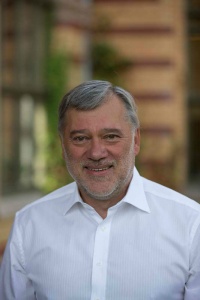Prof. Jürgen Kurths
February 19, 2015
13.30 – 15.00
Beijing-2 auditorium, China cluster, Skolkovo School of Management
SEMINAR ABSTRACT:
Complex networks were firstly studied by Leonhard Euler in 1736 when he solved the Königsberger (today Kaliningrad) Brückenproblem. Recent research has revealed a rich and complicated network topology in various fields of applications, such as transportation, power grids, social networks, or the WWW. It will be discussed whether this approach can be indeed useful or whether it is fashionable only and publish plenty of papers about.
After presenting a few basic approaches and concepts, the main part is then to discuss three fields of application in close connection with modern theoretical achievements:
A) Power Grids: Monster blackouts of power grids are an essential problem in our world. Based on the new concept of basin stability, we identify weak structures in power grids and propose design principles for getting stronger stability.
B) Climatology: Is there a backbone-like structure underlying the climate system? This approach allows us to uncover relations to global circulation patterns in oceans and atmosphere and to develop new efficient forecasting methods for extreme floods.
C) Neuroscience: A challenging task is to understand the implications of anatomic network structures on the functional organization of the brain activities during cognitive tasks.
SPEAKER INTRODUCTION:
Jürgen Kurths studied mathematics at the University of Rostock, got his PhD in 1983 and his Dr. habil. in 1990. He was full Professor at the University of Potsdam from 1994-2008 and has been Professor of Nonlinear Dynamics at the Humboldt University, Berlin and chair of the research domain Trans-disciplinary Concepts of the Potsdam Institute for Climate Impact Research since 2008. He is a fellow of the American Physical Society and of the Fraunhofer Society (Germany) and a member of the Academia Europaea. He was awarded a A. von Humboldt research price and the Richardson Medal of the European Geosciences Union. He got Honory Doctorates from the Lobachevsky Univ. Nizhny Nov-gorod and from the State Univ. Saratov.
His main research interests are synchronization phenomena, complex networks, time series analysis and their applications in climatology, sustainability research, physiology, systems biology and engineering.
He has supervised more than 60 PhD students from about 20 countries; more than 30 of them have now tenured positions in various countries. He has published more than 600 papers in peer-reviewed journals and two monographs which are cited more than 22.000 times (H-index: 66). He is in the editorial board of more than 10 journals.
He coordinated several large projects in EU and DFG and is now speaker of an International Research Training Group on complex networks (DFG and Brazil) and of a Megagrant (Russia).

